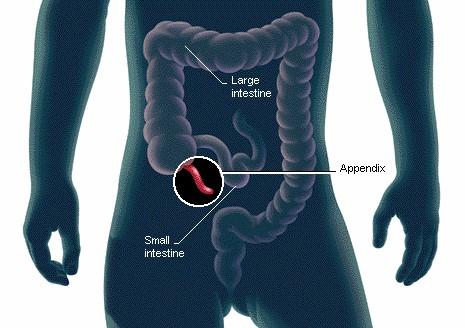Most people have heard of appendicitis – a dangerous inflammatory condition, but where is the appendix? The appendix, officially termed the vermiform appendix (worm-like appendage) is a small tissue sac. Within the appendix are bacteria and lymphatic tissue that's involved in the immune system. Read on to find out more about this small but fascinating part of your body.

Where Is the Appendix?
The appendix is a small finger-like pouch attached to the cecum – the section at the start of the large intestine. You'll find the appendix situated at an area known by doctors as McBurney's point in the lower right abdominal region, which is 1/3 of the distance from the anterior superior iliac spine to the navel. Pain or tenderness at McBurney's point when pressure is applied may indicate appendicitis.
What Are the Functions of the Appendix?
Scientists are still unsure about the appendix's exact role. The digestive system produces enzymes and hormones, which break down and absorb food along with the muscles lining the gastrointestinal tract. However, the appendix isn't directly involved with the digestive process. What's more, patients who have had their appendix removed don't seem to develop any health problems due to its absence.
The appendix has traditionally been thought to be what's known as a vestigial organ, a previously functional organ that has evolved over centuries into a remnant of what it once was. The only other animals that have an appendix are the great apes, our nearest animal cousins.
Plant-eating mammals have a much bigger cecum than humans do. This fact led Charles Darwin to hypothesize that early humans also possessed enlarged ceca, allowing them to have a diet rich in leaves, as herbivore animals do today. However, as the human population started eating a more fruit-based diet, which makes digestion a lot easier, the human cecum began to decrease in size. The appendix is thought to be a shrunken section of the cecum, which, despite evolution, remains in our bodies.
Common Illnesses with Appendix
Many people want to know the answer to where is the appendix so that they know if they have a problem in that organ. Here are common problems:
1. Appendicitis
When the appendix becomes swollen and inflamed, this is termed appendicitis. In severe cases, the appendix may rupture. This is an emergency situation as it can be fatal. According to the National Institute of Health, appendicitis is the most common reason for emergency abdominal surgery in America. And it is most often seen in children and young adults aged 10-30, but it can occur at any age.
Early Signs of Appendicitis
Appendicitis is a dangerous condition, and the appendix can burst only 2-3 days after you first experience symptoms. These symptoms can vary, but if you spot any of the following, you should see a doctor as soon as you can.
A Painful, Bloated Abdomen
One of the first appendicitis symptoms you notice is bloating in the abdomen. You'll also experience pain, starting in the naval area and radiating towards the lower right abdomen. This pain will become intense, and won't go away, usually increasing with time.
When you touch the abdomen, it will feel tender with increased pain whenever you move around or inhale deeply. There will also be sharp pain during jolting, sneezing, or coughing movements. Noticeable abdominal swelling may be detected in severe cases of appendicitis.
Low-Grade Fever
A mild fever, usually just below 100°F, is common during appendicitis, and you may have chills. Your fever may increase if the appendix has ruptured and this has led to infection.
Digestive Upsets
You will experience loss of appetite and unwillingness to eat. In addition to that, you may experience nausea and vomiting during appendicitis. Some patients suffer diarrhea or constipation, or have difficulty breaking wind.
2. Tumors of the Appendix
Growths in the appendix are quite rare. They may be benign or cancerous. Malignant appendix tumors can cause wheezing, flushing, and diarrhea, through the secretion of harmful chemicals.
